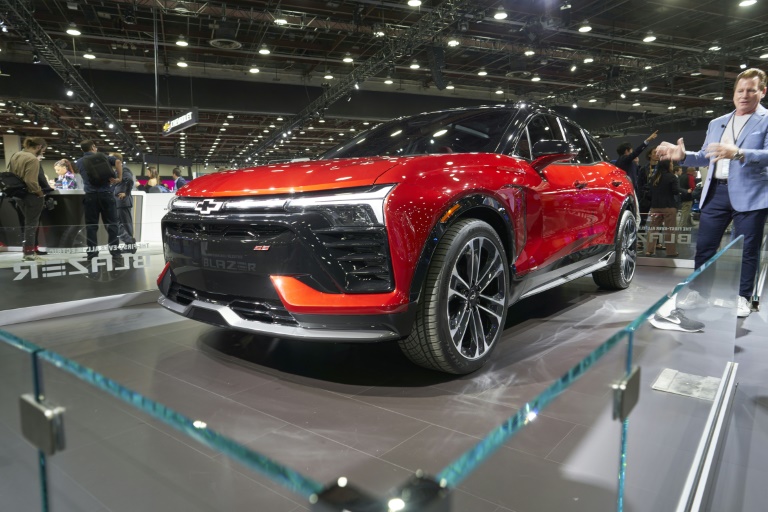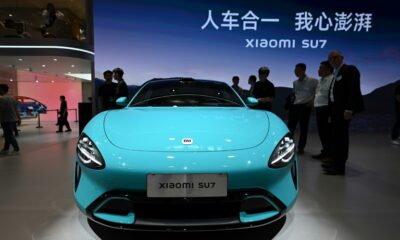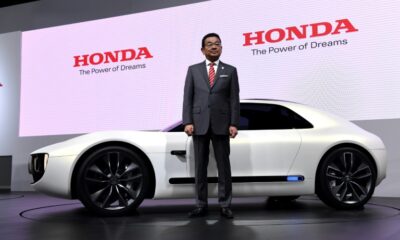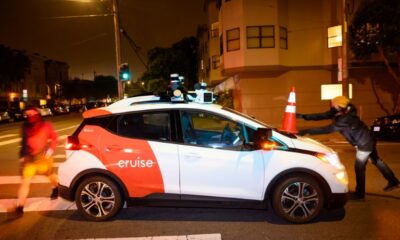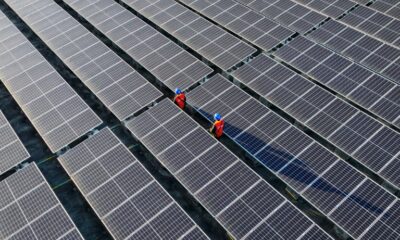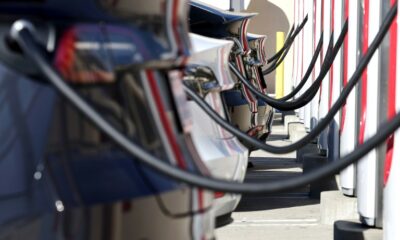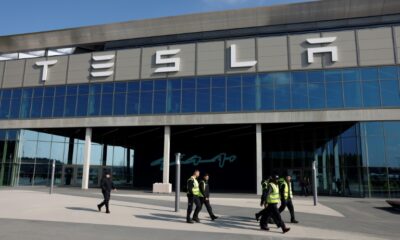A revived Detroit Auto Show kicked off in earnest Wednesday, with US car giants showcasing a mix of gasoline and electric vehicles (EV) ahead of an address by President Joe Biden.
Wednesday’s media day opened with presentations by General Motors and Stellantis brands ahead of the speech by Biden, who toured the showroom floor in his latest visit to Michigan, a critical presidential swing state.
The presidential visit has boosted the profile of the Detroit gathering, but Biden’s presence also forced a last-minute rejiggering of the schedule in the first Detroit show since 2019 following pandemic cancelations.
The gathering, shifted to fall from its old January time slot, is much smaller than in years past, with most foreign automakers and newer players like Tesla not presenting.
While gasoline-powered cars still dominate US roads, Detroit auto giants are unveiling more and more EVs as they pump billions of dollars in investment in a bid to wrest control of a growing market from Tesla and newer upstarts amid concerns over climate change and petroleum dependency.
“People are on the precipice of a massive adoption of EVs,” Chevrolet Vice President Steve Majoros told AFP shortly before presenting the General Motors brand’s electric versions of top-selling trucks.
“More and more Americans are ready,” said Majoros, pointing to the boost to consumer confidence from the increased number of EV charging stations.
Chevy, which unveiled Wednesday a performance edition of its Tahoe gasoline-powered truck, plans this weekend to launch a new media blitz highlighting its electric vehicle offerings at different price points in ways that will lead to “mainstream EV adoption at scale,” Majoros told the gathering.
Stellantis brand Jeep released a 30-year commemorative edition of the popular Grand Cherokee SUV, as well as a new fifth-generation model that is the first Jeep plug-in hybrid.
– Corvette fan –
Midway through the morning, the Detroit convention center was cleared of journalists to secure the space for Biden, who was greeted by GM Chief Executive Mary Barra and other top GM officials before test-driving the Cadillac Lyriq, a luxury EV.
The US president said he liked the Lyriq, but took a particular shine to an Orange Corvette he had earlier examined, according to a White House pool press report.
“He said he’s driving it home,” Barra said of Biden’s reaction to the Corvette, a gasoline-powered vehicle.
Biden, who also met with top brass from Stellantis and Ford, as well as labor and Michigan political leaders, is expected to tout major legislative victories in recent weeks on federal funding for semiconductor investment and climate change mitigation.
A White House fact sheet highlighted a deluge of investment decisions by companies that have amounted to nearly $85 billion in investment on manufacturing of EVs, batteries, and chargers in the United States since Biden took office.
“The President’s economic plan has generated an American, EV manufacturing boom that is creating new economic opportunity and tens of thousands of good-paying and union jobs across the country,” the fact sheet said.
Biden has a long and generally warm relationship with Detroit giants after presiding as vice president over the bailouts following the 2008 financial crisis.
As president, he has visited both GM and Ford.
Biden “has given a lot of kudos to the Detroit automakers,” said Jessica Caldwell, executive director of insights for the automotive research firm Edmunds.
“He’s been seen driving a lot of their products at the White House and all sorts of other places.”
– Sourcing rules –
But automakers have been griping about a provision in the just-passed Inflation Reduction Act that sets strict sourcing requirements for federal EV subsidies.
The requirement is meant to prod automakers into using EV batteries produced in North America as well as critical materials sourced from North America or countries with which the United States has a free trade agreement.
Automakers are hoping officials in Washington may show flexibility in implementing the rule.
“There’s still a lot of guidance the government has to come forward with,” said Chevrolet’s Majoros. “We’re looking at future plans, we’re studying how things might adapt what we do from a sourcing perspective.”
Majoros said it is too soon to say whether the rule will prevent new subsidies for key vehicles, such as the Equinox, an SUV unveiled last Thursday with a starting price of $30,000, an affordable level in a pricey space.
The GM brand plans to begin modest production of the Equinox in 2023, but that 2024 would be a “big year” with higher output, Majoros said. Production will go still higher in 2025, but Chevy isn’t releasing specific targets.
Majoros said Chevrolet has capacity to “flex” output depending on demand, adding, “There’s a lot of questions about the rate at which industry will adapt.”

 Business4 months ago
Business4 months ago
 Business5 months ago
Business5 months ago
 Events3 months ago
Events3 months ago
 People4 months ago
People4 months ago
 Events6 months ago
Events6 months ago
